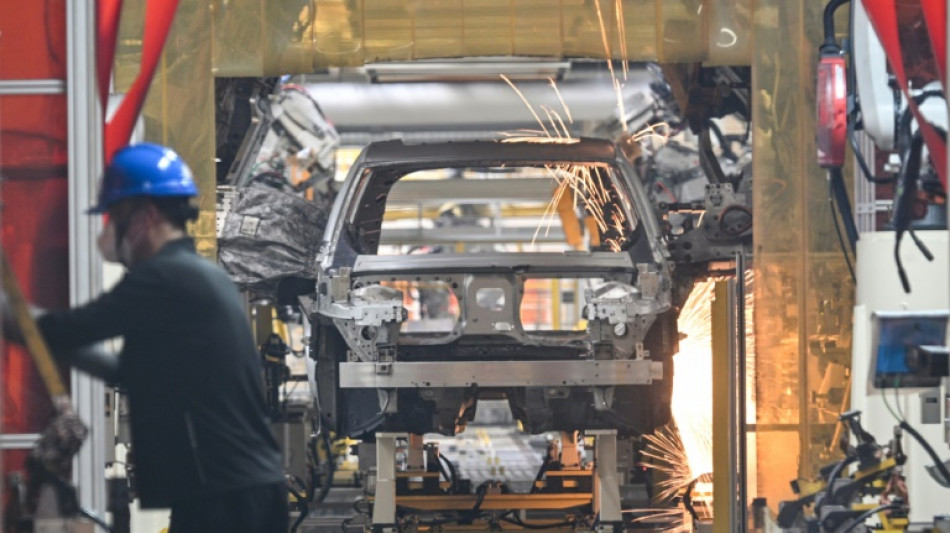
-
 Israel reopens key roads as firefighters battle blaze
Israel reopens key roads as firefighters battle blaze
-
Europe far-right surge masks divisions

-
 James will mull NBA future after Lakers playoff exit
James will mull NBA future after Lakers playoff exit
-
Ukraine's chief rabbi sings plea to Trump to side with Kyiv

-
 Australian mushroom meal victim 'hunched' in pain, court hears
Australian mushroom meal victim 'hunched' in pain, court hears
-
Lakers dumped out of playoffs by Wolves, Rockets rout Warriors

-
 Booming tourism and climate change threaten Albania's coast
Booming tourism and climate change threaten Albania's coast
-
US reaching out to China for tariff talks: Beijing state media

-
 Tariffs prompt Bank of Japan to lower growth forecasts
Tariffs prompt Bank of Japan to lower growth forecasts
-
Kiss faces little time to set Wallabies on path to home World Cup glory

-
 Serbian students, unions join forces for anti-corruption protest
Serbian students, unions join forces for anti-corruption protest
-
Slow and easily beaten -- Messi's Miami project risks global embarrassment

-
 Fan in hospital after falling to field at Pirates game
Fan in hospital after falling to field at Pirates game
-
Nuclear power sparks Australian election battle

-
 Tokyo stocks rise as BoJ holds rates steady
Tokyo stocks rise as BoJ holds rates steady
-
Bank of Japan holds rates, lowers growth forecasts

-
 'Sleeping giants' Bordeaux-Begles awaken before Champions Cup semis
'Sleeping giants' Bordeaux-Begles awaken before Champions Cup semis
-
Napoli eye Scudetto as Inter hope for post-Barca bounce-back

-
 Germany's 'absolutely insane' second tier rivalling Europe's best
Germany's 'absolutely insane' second tier rivalling Europe's best
-
PSG minds on Arsenal return as French clubs scrap for Champions League places

-
 UK WWII veteran remembers joy of war's end, 80 years on
UK WWII veteran remembers joy of war's end, 80 years on
-
Myanmar junta lets post-quake truce expire

-
 Rockets romp past Warriors to extend NBA playoff series
Rockets romp past Warriors to extend NBA playoff series
-
Messi, Inter Miami CONCACAF Cup dream over as Vancouver advance

-
 UN body warns over Trump's deep-sea mining order
UN body warns over Trump's deep-sea mining order
-
UK local elections test big two parties

-
 US judge says Apple defied order in App Store case
US judge says Apple defied order in App Store case
-
Seventeen years later, Brood XIV cicadas emerge in US

-
 Scorching 1,500m return for Olympic great Ledecky in Florida
Scorching 1,500m return for Olympic great Ledecky in Florida
-
Israel's Netanyahu warns wildfires could reach Jerusalem

-
 Istanbul lockdown aims to prevent May Day marches
Istanbul lockdown aims to prevent May Day marches
-
Formation Metals Announces Appointment of Adrian Smith to Advisory Committee

-
 Cerrado Gold Announces Q4 And Annual 2024 Financial Results
Cerrado Gold Announces Q4 And Annual 2024 Financial Results
-
Australian guard Daniels of Hawks named NBA's most improved

-
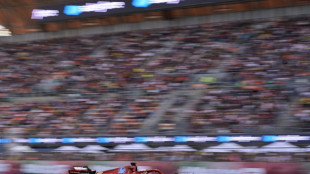 Mexico City to host F1 races until 2028
Mexico City to host F1 races until 2028
-
Morales vows no surrender in bid to reclaim Bolivian presidency
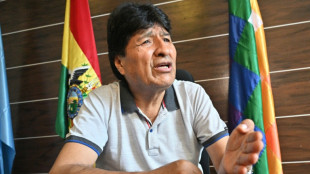
-
 Ukraine, US sign minerals deal, tying Trump to Kyiv
Ukraine, US sign minerals deal, tying Trump to Kyiv
-
Phenomenons like Yamal born every 50 years: Inter's Inzaghi

-
 Ukraine, US say minerals deal ready as Kyiv hails sharing
Ukraine, US say minerals deal ready as Kyiv hails sharing
-
Global stocks mostly rise following mixed economic data
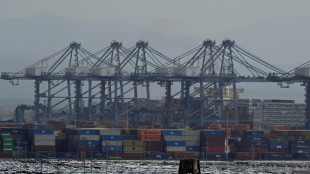
-
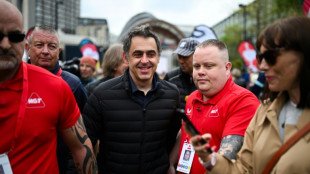 O'Sullivan says he must play better to win eighth snooker world title after seeing off Si Jiahui
O'Sullivan says he must play better to win eighth snooker world title after seeing off Si Jiahui
-
Sabalenka eases past Kostyuk into Madrid Open semis

-
 Netflix's 'The Eternaut' echoes fight against tyranny: actor Ricardo Darin
Netflix's 'The Eternaut' echoes fight against tyranny: actor Ricardo Darin
-
US economy unexpectedly shrinks, Trump blames Biden
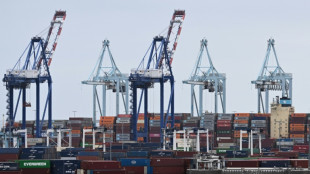
-
 Barca fight back against Inter in sensational semi-final draw
Barca fight back against Inter in sensational semi-final draw
-
Meta quarterly profit climbs despite big cloud spending
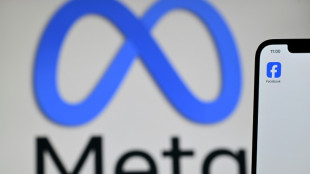
-
 US Supreme Court weighs public funding of religious charter school
US Supreme Court weighs public funding of religious charter school
-
Climate change made fire conditions twice as likely in South Korea blazes: study
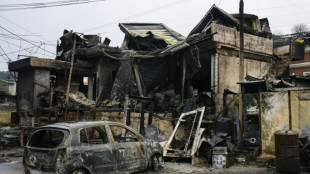
-
 Amorim says not even Europa League glory can save Man Utd's season
Amorim says not even Europa League glory can save Man Utd's season
-
Syria reports Israeli strikes as clashes with Druze spread


Foreign carmakers strive for 'China Speed' to stay in race
In fluid synchronisation, dozens of robotic arms picked up metal parts and welded them onto vehicle beds, as car skeletons gradually took shape and progressed along an automated factory floor near the eastern Chinese city of Ningbo.
Across the country, car models rolling off assembly lines like this have gone from concept to release in record time -- known in the industry as "China Speed", the envy of foreign competitors.
At EV firm Zeekr's vast Ningbo plant, advanced robotics and artificial intelligence have been leveraged at every stage of the manufacturing process to save huge amounts of time and money.
In the casting shop, a robotic arm that towered over the human foremen supervising it picked up a freshly made piece of aluminium and dunked it into a vat of water, sending steam hissing out, before passing the metal to another machine to cut and press it.
The factory still employs around 2,500 workers to do some delicate tasks and for quality control.
But the heavy lifting is done by hundreds of tireless robots, with some processes going on 24 hours a day.
And it's not just manufacturing that has been accelerated.
Zeekr has a research and development base in Sweden, which allows workloads to be shared across timezones. Its parent company, Geely, also owns Swedish automaker Volvo.
In the factory's car park, hundreds of gleaming, plate-less Zeekr 7X SUVs stood ready to be transported to dealerships.
"The future is our history," read a slogan above the entrance hall.
- 'Make-or-break moment' -
Factories and companies like this have set a new pace in the industry.
"We are at a make-or-break moment for established global automakers," a recent report by consulting firm Bain & Company said.
En route to the factory, AFP saw lorries carrying brand new Zeekr cars headed to Ningbo's huge port, bound for export to places like Australia.
The most innovative Chinese manufacturers spend less than a third of that spent by traditional competitors to develop new vehicles, the Bain report said.
While legacy automakers often take 48 to 54 months to bring out new models, the timeline for younger brands is more like 24 to 30, it added.
Some of Zeekr's models only took 15 months to develop, a spokesman told AFP.
The results are clear in the sheer choice available to consumers: There are currently 2,755 models on offer from 163 brands in the Chinese market, authorities say.
At industry show Auto Shanghai, which opened Wednesday, more than 100 new models were launched.
Jostling in the pack were not just Chinese firms like Zeekr, BYD and Chery, but also foreign rivals hitting the gas to catch up.
Volkswagen and Nissan launched tens of new models developed "in China for China" at the show, with executives insisting they had adapted to "China Speed".
The acceleration has been helped by the shift towards EVs, disposing of the complex internal combustion engine.
"You start by designing the car virtually, making as few prototypes as possible, so you can move very quickly," BCG consultant Mikael Le Mouellic told AFP.
Design and engineering will then work hand-in-hand, and often "reuse recipes that work", he added.
Zeekr's "Sustainable Experience Architecture", for example, can be the bed for A-class to E-class cars, saving time and money.
- Three years to nine months -
Foreign suppliers have also had to adapt.
Traditionally, companies could take up to three years to design, for example, a new headlamp, said Michael Fischer, boss at French automotive parts maker Forvia.
"In China that doesn't work," he said.
Now, "we have a process that is going to be very organised, that's going to secure for quality, but can bring up a new headlamp in as little as nine months".
At competitor Valeo's factory in Changshu, north of Shanghai, four large robots assembled LED headlamps for Zeekr and other brands.
"We don't work 24/7!" joked Valeo's innovation manager in China, Gu Jianmin. "But we use existing solutions, and we work upstream with the automakers."
Development and durability tests that "would have taken months" are helped along by AI and other technology.
"Chinese manufacturers are a little more demanding. But foreigners are trying to catch up," said Gu.
"To emerge in China, you have to be at the same level as the locals."
O.Johnson--AMWN